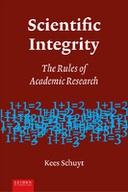Explore

The growing attention for scientific integrity is part of a wider culture of professionalization and accountability − which appears to signal that integrity is no longer self-evident as a core value of professional conduct. Examples abound. But what is scientific integrity? Why does it matter? What are the issues, and what is at stake? What do we know about the nature and scope of violations of scientific integrity? In this book, Kees Schuyt explores the concept of integrity, describes various cases of fraud and other types of dishonest behaviour in research practice, and offers a reflective and pragmatic framework for handling transgressions against the rules of academic research. Drawing on a wide variety of historical examples, Schuyt looks into matters ranging from the codification of scientific integrity to the difference between misconduct, questionable practices, and honest errors, and the uses and abuses of the notion of plagiarism. Last but not least, he considers how the norms and values of academic research can best be transmitted to students and new generations of researchers.
This book is included in DOAB.
Why read this book? Have your say.
You must be logged in to comment.
Rights Information
Are you the author or publisher of this work? If so, you can claim it as yours by registering as an Unglue.it rights holder.Downloads
This work has been downloaded 163 times via unglue.it ebook links.
- 135 - pdf (CC BY-NC) at OAPEN Library.
Keywords
- Academic research
- Criminal law & procedure
- Fraud
- Law
- Laws of Specific jurisdictions
- Plagiarism
- Reference, information & interdisciplinary subjects
- Research & information: general
- Scientific integrity
- Sefl-plagiarism
- thema EDItEUR::G Reference, Information and Interdisciplinary subjects::GP Research and information: general
- thema EDItEUR::L Law::LN Laws of specific jurisdictions and specific areas of law::LNF Criminal law: procedure and offences::LNFN Fraud
Links
DOI: 10.24415/9789087282301Editions



